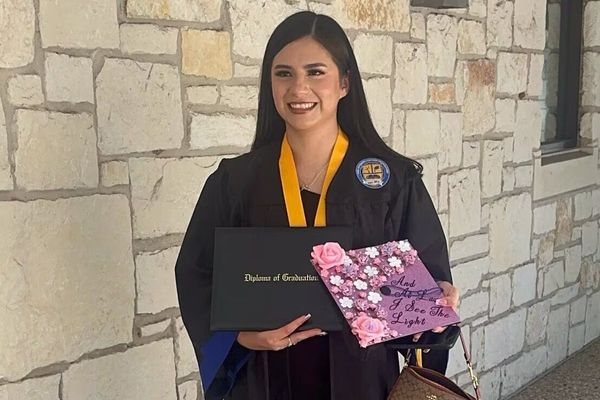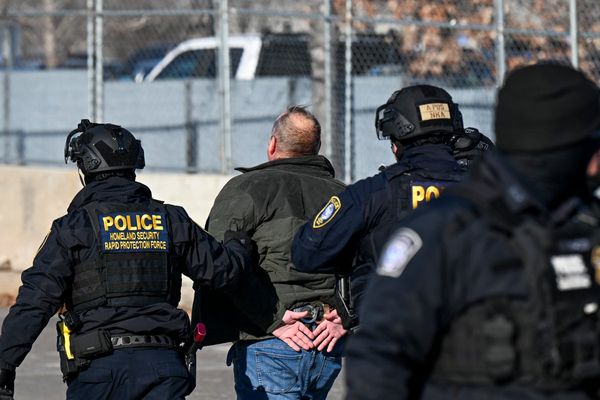
Mahmoud Khalil, the Columbia University graduate and detained Palestinian activist, was finally allowed to hold his infant son for the first time on Thursday – one month after he was born – thanks to a federal judge who blocked the Trump administration’s efforts to keep the father and infant separated by a Plexiglass barrier.
The visit came before a scheduled immigration hearing for Khalil, a legal permanent resident who has been detained in a Louisiana jail since 8 March.
The question of whether Khalil would be permitted to hold his newborn child, Deen, or forced to meet him through a barrier had sparked days of legal fighting, triggering claims by Khalil’s attorneys that he is being subject to political retaliation by the government.
On Wednesday night, a federal judge in New Jersey, Michael Farbiarz, intervened, allowing the meeting to go forward on Thursday morning, according to Khalil’s attorneys.
The judge’s order came after federal officials said this week they would oppose his attorney’s effort to secure what’s known as a “contact visit” among Khalil; his wife, Noor Abdalla; and their son.
Instead, they said Khalil could be allowed a “non-contact” visit, meaning he would be separated from his wife and son by a plastic divider and not allowed to touch them.
“Granting Khalil this relief of family visitation would effectively grant him a privilege that no other detainee receives,” justice department officials wrote in a court filing on Wednesday. “Allowing Dr Abdalla and a newborn to attend a legal meeting would turn a legal visitation into a family one.”
Brian Acuna, acting director of the Ice field office in New Orleans, said in an accompanying affidavit that it would be “unsafe to allow Mr Khalil’s wife and newborn child into a secured part of the facility”.
In their own legal filings, Khalil’s attorneys described the government’s refusal to grant the visit as “further evidence of the retaliatory motive behind Mr Khalil’s arrest and faraway detention”, adding that his wife and son were “the farthest thing from a security risk”.
They noted that Abdalla had traveled nearly 1,500 miles (2,400km) to the remote detention center in hopes of introducing their son to his father.
“This is not just heartless,” Abdalla said of the government’s position. “It is deliberate violence, the calculated cruelty of a government that tears families apart without remorse. And I cannot ignore the echoes of this pain in the stories of Palestinian families, torn apart by Israeli military prisons and bombs, denied dignity, denied life.”
Khalil was the first person to be arrested under Donald Trump’s promised crackdown on protesters against the war in Gaza and is one of the few who have remained in custody as his case winds its way through both immigration and federal court.
Federal authorities have not accused Khalil of a crime, but they have sought to deport him on the basis that his prominent role in protests against Israel’s war in Gaza may have undermined US foreign policy interests.
His request to attend his son’s 21 April birth was denied last month by US Immigration and Customs Enforcement.
In a letter to his son published in the Guardian, Khalil wrote after the birth: “My heart aches that I could not hold you in my arms and hear your first cry, that I could not unfurl your clenched fists or change your first diaper.
“My absence is not unique,” Khalil added. “Like other Palestinian fathers, I was separated from you by racist regimes and distant prisons. In Palestine, this pain is part of daily life … The grief your mother and I feel is but one drop in a sea of sorrow that Palestinian families have drowned in for generations.”
Farbiarz is currently considering Khalil’s petition for release as he appeals a Louisiana immigration judge’s ruling that he can be deported from the country.
On Thursday, Khalil appeared before that immigration judge, Jamee Comans, as his attorneys presented testimony about the risks he would face if he were to be deported to Syria, where he grew up in a refugee camp, or Algeria, where he maintains citizenship through a distant relative.
His attorneys submitted testimony from Columbia University faculty and students attesting to Khalil’s character.
In one declaration, Joseph Howley, a classics professor, said he had first introduced Khalil to a university administrator to serve as a spokesperson on behalf of campus protesters, describing him as an “upstanding, principled and well-respected member of our community.
“I have never known Mahmoud to espouse any anti-Jewish sentiments or prejudices, and have heard him forcefully reject antisemitism on multiple occasions,” Howley wrote.
No ruling regarding the appeal was made on Thursday. Comans gave lawyers in the case until 5pm 2 June to submit written closing arguments.
Columbia’s interim president, Claire Shipman, acknowledged Mahmoud’s absence from Wednesday’s commencement ceremony and said many students were “mourning” that he could not be present. Her speech drew loud boos from some graduates, along with chants of “free Mahmoud”.
Abdalla accepted a diploma for Khalil on his behalf at an alternative graduation ceremony on Sunday.
In the 75 days since his arrest, at least three other international college students have been released from detention after weeks of legal action by their attorneys. They include Rümeysa Öztürk, Mohsen Mahdawi and Badar Khan Suri.
All three have been targeted for deportation by the Trump administration, and have challenged the legality of their detentions with a string of motions and legal briefs in federal district courts. The judges in all of their cases agreed to release them while their immigration court cases played out.







